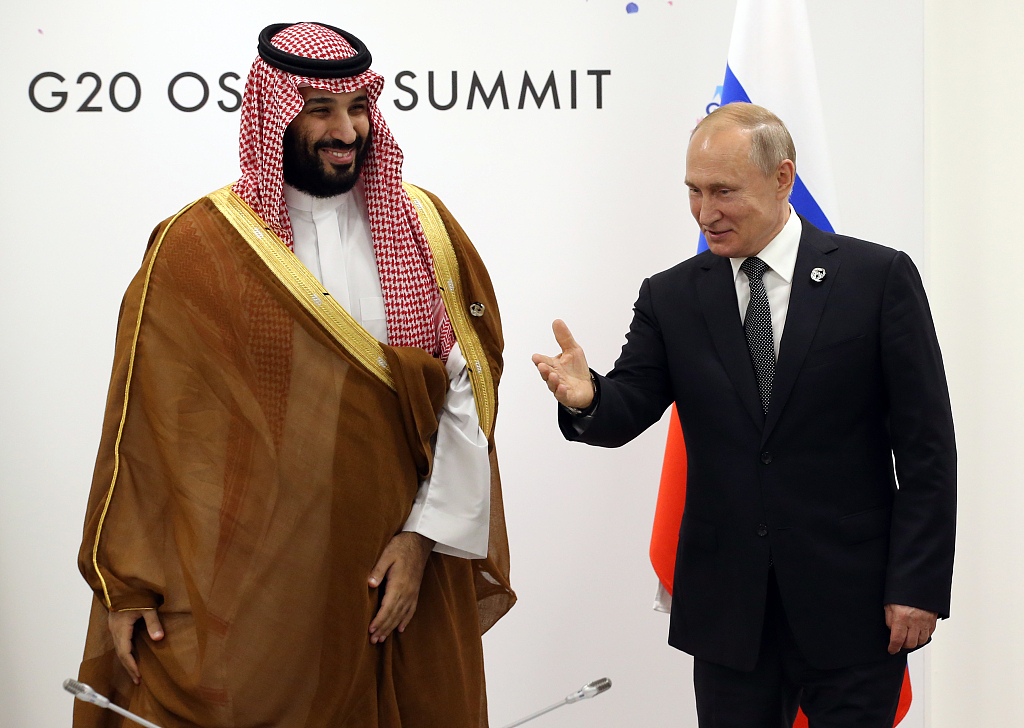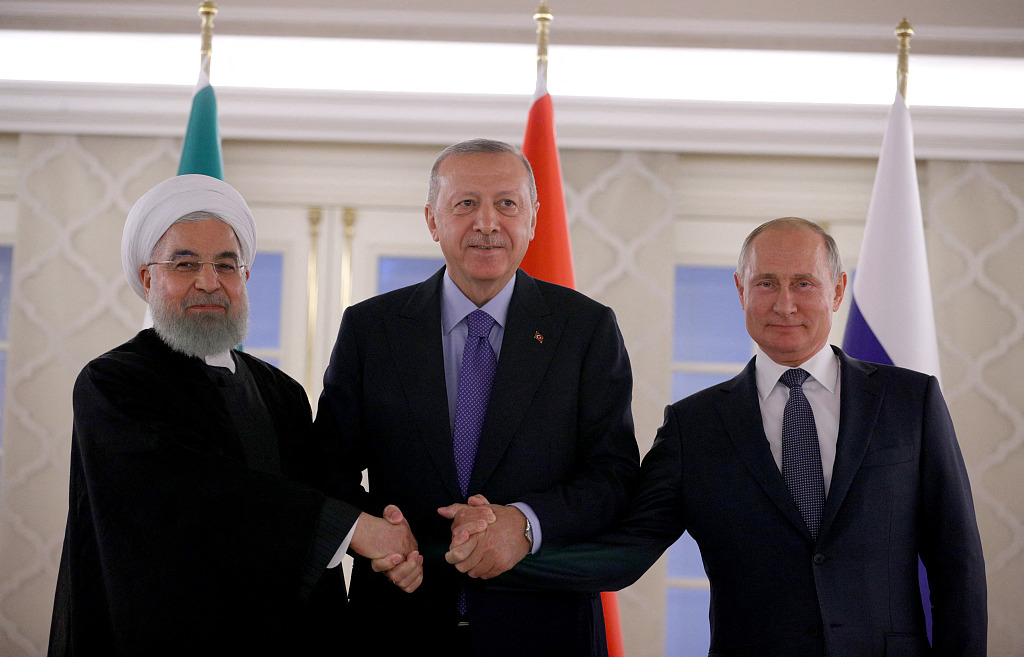The United States has been deeply involved in the Middle East for years, but that doesn't mean Russia isn't making plans. From holding the Syria summit with Turkey and Iran to Russian President Vladimir Putin's forthcoming visit to Saudi Arabia, Moscow is no stranger to this area both in theory and practice.
Saudi Arabia
The Russian Direct Investment Fund (RDIF), Russia's sovereign wealth fund, opened its first foreign office in Saudi Arabia Wednesday, ahead of Putin's upcoming tour to the kingdom.

Russian President Vladimir Putin (R) and Saudi Arabia's crown prince Mohammad bin Salman al Saud attend their bilateral talks at the G20 Osaka Summit in Osaka, Japan, June 29, 2019. /VCG Photo
Russian President Vladimir Putin (R) and Saudi Arabia's crown prince Mohammad bin Salman al Saud attend their bilateral talks at the G20 Osaka Summit in Osaka, Japan, June 29, 2019. /VCG Photo
Read more:
Why are the arms sales to Saudi Arabia controversial?
Will Putin's Saudi Arabia visit change the Middle East order?
On what to expect during the trip, Kirill Dmitriev, CEO of the Russian Direct Investment Fund, told reporters on Sunday that there is one big project which is"very exciting" that would be announced.
"Both sides are going to be signing more than 10 new investment agreements between Russia and Saudi Arabia in the oil industry, agriculture, tourism and petrochemicals," he added.
Throughout the past years, Russian-Saudi ties have seen positive progress.
Following attacks on Saudi oil facilities in September, Putin held out an olive branch to provide respective assistance to Saudi Arabia.
"We are ready to provide respective assistance to Saudi Arabia, and it would be enough for the political leadership of Saudi Arabia to make a wise government decision – as the leaders of Iran did in their time by purchasing S-300 and as (Turkish) President (Recep Tayyip) Erdogan did by purchasing the latest S-400 'Triumph' air defense systems from Russia," Putin said.
Iran
Putin condemned the Saudi oil attacks, but also defended Iran, stressing that there was no evidence that the country was responsible for the attack and that the U.S. had not presented any proof of its role.
Read more:
Why Russia and Iran are ditching the dollar
Iran, Russia are throwing sand in gears of U.S. sanctions
"We condemn these (attacks) but we are against shifting the blame to Iran because there is no proof of that," Putin said, adding that Iranian President Hassan Rouhani had personally told him Tehran had nothing to do with the attacks.

(L-R) Iranian Prsident Hassan Rouhani, Turkish President Recep Tayyip Erdogan and Russian President Vladimir Putin pose for photographers in Ankara, Turkey, September 16, 2019. /VCG Photo
(L-R) Iranian Prsident Hassan Rouhani, Turkish President Recep Tayyip Erdogan and Russian President Vladimir Putin pose for photographers in Ankara, Turkey, September 16, 2019. /VCG Photo
Last month's attack briefly reduced Saudi Arabia's oil output by half, causing a spike in oil prices, but Riyadh has been able to quickly restore production, calming the market.
Syria
Maintaining close ties with both Iran and Saudi Arabia, Russia seems not forget to balance the relations between Turkey and Syria.
Turkish President Erdogan said on his Twitter Wednesday that the operation in northeastern Syria has started.
Read more:
Opinion: What do Turkey, Russia and Iran agree on over Syria?
Analysis: Is Russia the biggest winner of Trump's Syria pullout?
On Monday, Kremlin said it hopes that a counterterrorism operation planned by Turkey in northern Syria will not hurt the political and territorial integrity of the Middle East country.
One month earlier, the leaders of Russia, Iran and Turkey made a joint announcement about a committee being formed to rewrite Syria's constitution as part of a political solution to the country's nine-year civil war.
Russia and Iran are key allies of Syrian President Bashar Assad while Turkey backs Syrian rebels seeking to oust him.
Despite divergent interests in Syria, Erdogan and Putin have been building closer ties – they met seven times in 2019 alone. Russia has delivered two batteries of the S-400 surface to air missile systems to Turkey and the two countries are cooperating on energy deals.
(Cover photo by CGTN's Gao Hongmei)